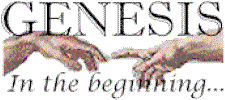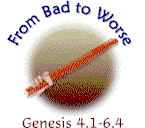
![]()
 LESSON 4
LESSON 4| Read Psalm 4. | |
| In your opening prayer, pray for the strengthening of and healing in family relationships. |
![]()
| When I was a child, the funniest thing that ever happened to my brother/sister/cousin and me was... | |
| The angriest I’ve ever been was when... | |
| I have a scar that I got when... |
![]()
Skim through Genesis 4.1-6.4 and fill
in this outline:
|
| 4.1 - Note that Adam and Eve fulfill God’s command to be fruitful and multiply (Gen 1.28). | |
| 4.1-2 - In Hebrew, the word "I produced/created" is qaniythi ; the word for "Cain" is qayin which means "Production, Acquisition." "Abel" means "Emptiness, Futility." Incidentally, though it does not occur in this story, the Hebrew word for "jealous" is qanè’. | |
| 4.3-5 - It is not clear why Cain’s offering is not acceptable. It is emphasized that Abel’s offering is of the "firstlings of his flock, their fat portions" which indicates the very best. | |
| 4.5-7 - Cain’s "countenance fell": This is a literal rendering of the Hebrew. We might use words like "downcast, downhearted, feeling down, etc." In v. 7, what is translated as "will you not be accepted" literally is "there is a lifting up." | |
| 4.9 - "... Am I my brother’s keeper?" The implied answer here would seem to be "No." A human can "keep" a garden (Gen 2.15) or a flock (Gen 30.32) or an ox (Exod 21.29) but not another human. God, however, does "keep" (in the sense of "guard, watch over") humans (Ps 16.1, 17.8, 91.11), much in the way that God keeps Cain in Genesis 4.15. | |
| 4.14-16 - We do not know where the land of Nod is, but in Hebrew, the word nod is different only by the placement of the smallest dot from the word nud which means “wander.” In 4.12 and 14, Cain is identified as a “wanderer.” | |
| Cain and Abel in the New Testament: The following passages yield insight into how some people were interpreting this story. Matthew 23.35=Luke 11.51, Hebrews 11.4, 12.24, 1 John 3.12, Jude 11. | |
| Some notes on 4.17-6.4. In 4.17-24, we
are given some information about Cain's descendants. Most notably we are given a
description of the advancements of civilization: a city in verse 17, nomadic herding
culture in verse 20, musicians in verse 21, and metalsmiths in verse 22. The song in
verses 23-24, though, is an indication that not all human advancements were good, for now
Cain's descendant brags about unlimited violent revenge. Starting with 4.25 we return to
the story of Adam and Eve and their other descendants. 4.26 notes the formal beginnings of
‘religion.’ 5.1-2 plays upon the ambiguity of the Hebrew word adam
being both a reference to “humankind” as well as to an individual person, Adam.
In 5.3 we learn that the divine “image” and “likeness” in which adam
was created is continued in their children. Among the people listed in the genealogy, note
Enoch in 5.21-24 who “walked with God; then he was no more, because God took
him.” Methuselah is mentioned in 5.25-27. He became the oldest person mentioned in
the Biblical record, living to the ripe old age of 969! 5.32 brings us down to Noah and
prepares us for his story in 6.9 and following. In 6.1-4 we read about the increase of sin
which now even draws down heavenly beings (the “sons of God”) into its power
when they fall for the beauty of human women and have intercourse with them. Because the
earthly/heavenly boundary has now been transgressed, God must create a new boundary.
Humans, being flesh, shall now live no more than 120 years.
|
The voice of your brother’s blood cries unto Me (Genesis 4.10): though he shed the blood of one, it is said damim ("bloods") in the plural. Which teaches that the blood of Abel’s children and children’s children and all his descendants to the end of all generations destined to come forth from him—all of them stood crying out before the Holy One, blessed be He... [The story reminds us, then, that] he who sustains one soul is accounted by Scripture as though he had sustained a whole world... The Fathers According to Rabbi Nathan 31 |
![]()
| Read the article "Farmers, Founders, and Fratricide: The Story of Cain and Abel " by Leon R. Kass (First Things 62 [April 1996]: 19-26 available at http://www.firstthings.com/ftissues/ft9604/kass.html | |
| Note the observations (from a Jewish perspective) on the personalities of Cain and Abel at http://www.emanuelnyc.org/bulletin/archive/43.html | |
| Read the article "Jealousy and the Jews -- What does the Torah teach?" by Teresa Strasser HERE | |
| John Steinbeck's novel East of Eden
was based on the story of Cain and Abel. For an outline and background on the novel, go to
http://www.wwu.edu/~stephan/Steinbeck/east.html
|
![]()
How very good and pleasant it is when kindred live together in unity! Psalm 133.1 |
![]()
| Read Psalm 133. | |
| Read Hebrews 11.1-7. What are some things for which you, by faith, are hoping? | |
| Read Matthew 5.21-24. Learn from Jesus and seek to be reconciled with your brother or sister. Do it today. |
![]()